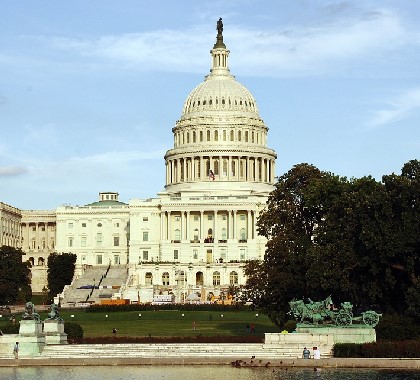President Donald Trump’s top trade advisor told lawmakers the president wants to include language in trade agreements that would trigger automatic renegotiation whenever the United States runs a trade deficit with a partner country.
A bill now before the Senate would contradict that goal by giving Congress a mechanism by which to preempt presidential trade actions.
Peter Navarro, the head of the National Trade Council and White House director of trade and industrial policy, made the comments at a February 15 closed-door meeting of the U.S. Senate Committee on Finance.
In January, U.S. Sen. Mike Lee (R-UT) introduced Senate Bill 177, The Global Trade Accountability Act of 2017, proposing a congressional preemption mechanism affecting presidential negotiating authority such as Navarro’s trade-deficit trigger policy. At press time, SB 177 remains under consideration by the U.S. Senate Committee on Finance.
If approved by Congress and signed into law by the president, the Global Trade Accountability Act would require the executive branch to brief lawmakers on proposed trade actions, including cost-benefit analyses of those actions, a policy already required when government agencies propose other forms of regulations. Lawmakers would then vote to approve or reject the proposed regulations.
Not Targeting Trump
Lee says his bill was not inspired by any actions by Trump, but instead is meant to address a longstanding problem.
“This bill is not focused on this particular president,” Lee told Budget & Tax News. “I started working on this project long before we knew who our nominee would be. This is about maintaining the separation of powers mandated by the Constitution.
“It’s not that I’m worried about Congress’ power so much as I am worried about the fact that members of Congress have seen fit to delegate power so that they can insulate themselves from voters,” Lee said. “When that happens, the democratic effect of elections becomes less meaningful, when those hired for the purpose of making law are delegating it to somebody else.”
Reasserting Congressional Power
Lee says he wants to help restore lawmakers’ seat at the policymaking table.
“We’re not bypassing the important role that the president can play in this process or that the executive branch can play,” Lee said. “The power to establish set policy, and have that be binding and subject to enforcement through the overpowering force that is government, needs to be separated. It needs to occur in two separate, coequal branches of government.”
Executive Power Tools
Bryan Riley, a senior policy analyst specializing in trade issues for The Heritage Foundation, says the executive branch has many tools with which to restrict trade.
“When there were calls to impose big tariffs on imports during the campaign, my first reaction was not to be too concerned, since I believed Congress has control of tariff rates,” Riley said. “However, there are actually several laws a president could potentially rely on to justify restrictions on U.S. trade. In 1971, for example, President Richard Nixon imposed an across-the-board 10 percent import surcharge.”
Riley says lawmakers have ceded rulemaking authority to the president over many years.
“Some of the authority to modify tariffs is a result of wartime powers intended to only be used in the event of a ‘national emergency,'” Riley said. “Some of the latitude results from efforts in the past to give the president authority to modify tariffs as part of trade agreements.”
‘Reasonable’ Reevaluation
Riley says reevaluating the balance of power between the executive and legislative branches is worth the effort.
“I think it’s a reasonable effort to try to limit the ability of the executive branch to unilaterally impose taxes without congressional consent,” Riley said. “There are several statutes that give the executive branch wide latitude to restrict international trade. Many of the statutes behind this power are decades old, and it is a good idea to revisit them.”




